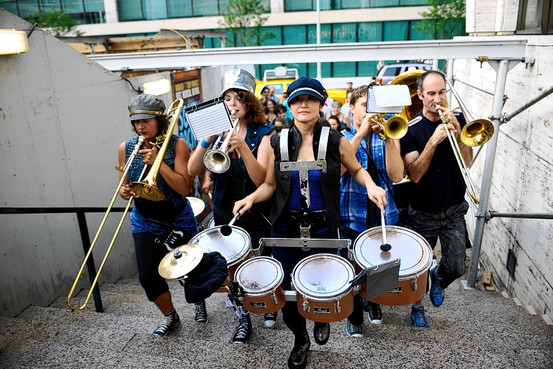
Pounding the Pavement With 24 Virtuosic Feet New York's One-of-a-Kind Asphalt Orchestra Readies Its Second Season at the Lincoln Center Out of Doors Festival
One recent morning, in the Stanley H. Kaplan penthouse on the Lincoln Center campus, a dozen of the city's sharpest contemporary musicians were doing their best to play like weary old men of the 1950s. The piece, taken from a 1956 field recording by the Laneville Johnson Union Brass Band, seems to limp and stumble on the scratchy original�which has been painstakingly transcribed and arranged. Watching the members of the Asphalt Orchestra work to capture its antique spirit is to marvel at the extremes of virtuosity. It sounds like a Mardi Gras for zombies. "I was pretty nervous about it," said Ken Thomson, a saxophonist and co-director of this conceptually maverick marching band, which next week will kick off its second season as the house band for the Lincoln Center Out of Doorsn festival. "Are we just going to sound terrible and nobody's going to get it?" The music, which was used by choreographer Paul Taylor for his 1956 "3 Epitaphs," will get its first live performance Thursday in the Damrosch Park Bandshell as part of the festival's celebration Mr. Taylor's 80th birthday. Oddly enough, it's the only piece in Asphalt's repertoire that has anything to do with brass-band tradition. Since making its debut last summer, the group has built its buzz on boisterous public displays and audacious arrangements of tunes by composers never heard during halftime shows�like Bjork, Frank Zappa, Conlon Nancarrow and the Swedish metal band Meshuggah. The music for "Three Epitaphs," though, is proving to be a unique challenge. "It's totally outrageous," Mr. Thomson continued, as trumpeters and percussionists gave their lips and shoulders a rest during a rehearsal break. "It's another way to push the band into this land of playing everything wrong and sharp. It's this new, different, gritty sound. When we do Bjork (the group covers her "Hyperballad"), things have to be tuned perfectly. It's really beautiful stuff. Now we have to figure out 'How can we get that further out of tune? How can we make that nastier?' It's almost going backwards." Such aesthetic drama is what makes the Asphalt Orchestra so thrilling to encounter. The band, which was conceived and recruited by the contemporary music organization Bang on a Can, draws its players from every cultural pocket, and likewise its repertoire. A self-titled debut album, out Aug. 3 on Cantaloupe Records, surveys the mad eclecticism of the orchestra's half-hour marching performances. Next week's Lincoln Center dates will offer premieres of new pieces commissioned from Yoko Ono, David Byrne and Annie Clark (aka St. Vincent), Tyondai Braxton (Battles) and "Passing Strange" collaborators Stew and Heidi Rodewald. During the orchestra's rehearsal, Bill Bragin, the energetic director of Lincoln Center Out of Doors, had been standing in a corner of the room, observing with an impish gleam. The orchestra can get away with playing almost anything, he explained, because a marching band is kind of a universal American experience. Everyone loves a parade. "It really disarms people who couldn't deal with this music in another form," he said. The band's kaleidoscopic range of influences allows it to adapt to all kinds of programming. "There's a phenomenon happening with brass bands from all over the world," Mr. Bragin said, looking forward to a possible encounter between Asphalt and New Orleans' Soul Rebels Brass Band on Aug. 8. Mr. Bragin also offered praise for the orchestra's fearless engagement of audiences, which often can be taken by surprise as the musicians roar across the institution's sprawling campus. "There's a lot of crowd interaction," said Jessica Schmitz, a piccolo player who co-directs the orchestra with Mr. Thomson. "That's one thing we play up when we go outside. Especially in New York. People are aggressive here. You have to get in their face and they'll get in your face. It's a lot of fun to mess with people � in a nice way." Ms. Clark also was present at the practice session, tinkering with audio files on her laptop as the brass players worked on tightly layered melodies that shifted back and forth in upper registers�a medieval technique called hocketing. The musicians were steadily fleshing out parts that the singer-songwriter had put together with Mr. Byrne. In a way, she admitted, working with the orchestra was like returning to a teenage enthusiasm. "I grew up in Texas, and my high school had a million-dollar football stadium," she said. "And the bigger the football team, the bigger the marching band. It's exhilarating." |



